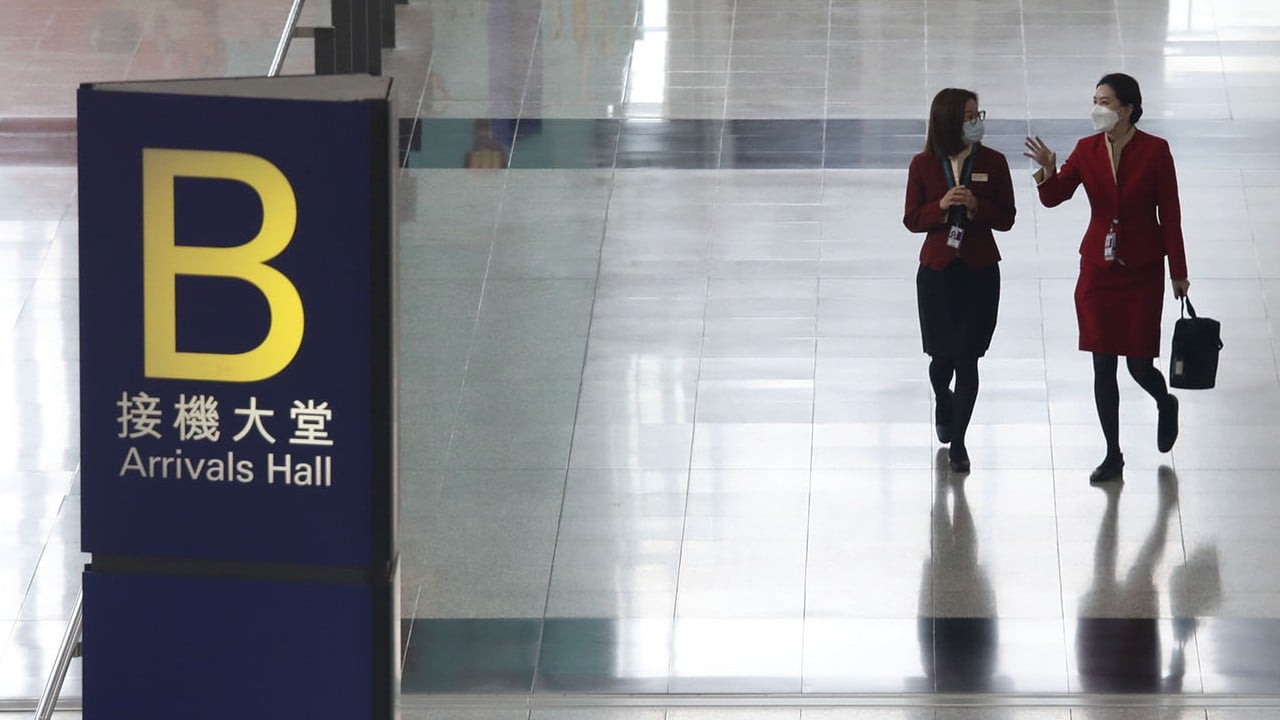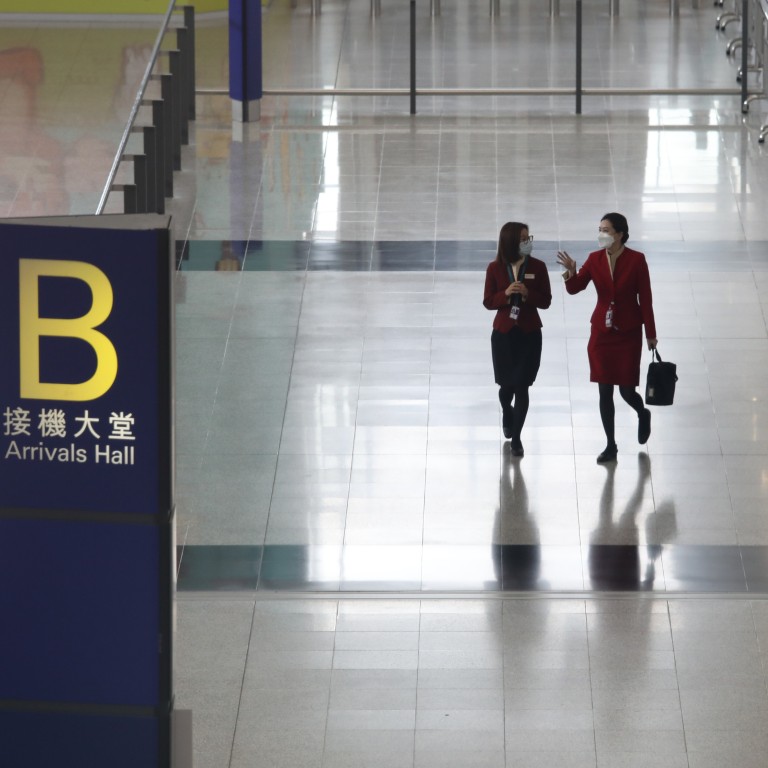
Coronavirus: Hong Kong to lift flight bans, reduce quarantine for arrivals as 14,068 new Covid cases reported
- Carrie Lam reveals changes to quarantine measures for residents, with the current 14-day period to be cut to seven if they test negative on the sixth and seventh day from arrival
- Changes to flight bans and quarantine to kick in on April 1
Key points
-
Flight bans on nine countries to be lifted on April 1
-
Hotel quarantine for fully vaccinated residents returning from overseas will be cut from 14 to seven days from April 1, on the condition travellers test negative on the fifth day via a PCR test, and via rapid antigen tests on the sixth and seventh day of their stay
-
Social-distancing measures will be eased in three phases over three months from April 21, provided there is no rebound in cases
-
The first phase involves gyms, game centres, beauty salons, religious venues and sports facilities reopening, dine-in hours in restaurants being extended, and restrictions on public and private gatherings being eased
-
The second phase involves the reopening of all other types of business that were forced to close under the fifth wave, including bars and pubs, along with further extensions to operating hours, and mask exemptions for outdoor activities
-
In the third phase, all limits on group sizes in restaurants and bars will be lifted, and operating hours will be further extended
-
Primary schools, international schools and kindergartens will resume face-to-face classes from April 19
-
Secondary schools will resume in-person classes after the Diploma of Secondary Education exams, which will kick off on April 22
-
Compulsory universal testing to be suspended
-
In the longer term, authorities will work on another road map for Hong Kong and seek to reopen the city’s border with the mainland
Hong Kong’s leader has announced a significant easing of tough pandemic-control measures from next month that will include halving the quarantine period for travellers arriving in the city and the lifting of flight bans on nine countries.
After conceding last week that the public had reached the limits of tolerance for the strictest anti-pandemic measures in the world, Chief Executive Carrie Lam Cheng Yuet-ngor on Monday revealed that following an interim review, the government would ease border restrictions from April 1, while putting on hold a contentious plan for compulsory universal testing of the entire population.
The current 14-day hotel quarantine period for Hong Kong residents returning from overseas would be reduced to seven days, as long as they tested negative repeatedly, she said.
Social-distancing rules will also be relaxed in three phases starting from April 21 if there is no rebound in cases. The rule changes will cover restaurants, gyms and other businesses, as well as public gatherings, while an existing ban on private gatherings of more than two households will also be lifted.
Schools will be able to resume face-to-face classes from April 19.
Hong Kong reported 14,068 new Covid-19 infections on Monday, the third day in a row the tally was below the 20,000 threshold. Of the latest cases, 9,545 were reported by people who took rapid tests and 4,523 were confirmed via PCR (polymerase chain reaction) tests, health officials said. Five cases were imported.
Health authorities also recorded 223 Covid-related deaths in the past 24 hours, including 44 previously unreported. The backlog of deaths included a 14-year-old boy who fell from height and died last Wednesday. He tested positive for the virus after being admitted to hospital.
The number of fatalities in the fifth wave has reached 5,906, with those who died aged from 11 months to 112 years, according to authorities.
At a regular press conference on the latest Covid-19 situation, Dr Chuang Shuk-kwan, head of the communicable disease branch of the Centre for Health Protection, said no new virus cases at care homes for the aged or disabled were detected in the previous 24 hours.
“This is a good sign. The reasons may be that the overall situation has stabilised in the past few days and also because most residents have been exposed to the virus … others may be vaccinated. We still need to observe for a longer period of time,” she said.
She noted that such institutions had been heavily affected in the latest wave, saying a total of 282 homes for the disabled and 776 of those for the aged had reported infections, involving 8,660 and 33,758 residents respectively.
Some 30 per cent of staff at the institutions for disabled and 28 per cent of those working in care homes for the aged had been infected, Chuang said.
‘Gradual relaxation of rules’
On the latest plan to lift the flight ban and ease other measures, Chuang noted it would be a gradual relaxation.
“The measures are not to be eased immediately. As the situation gets more stabilised, my understanding is that the social-distancing measures will be gradually relaxed accordingly,” she said.
“It is not too surprising to see a possible rebound of cases after relaxation of the measures. But we have to see the situation of the epidemic at that time, say, the number of cases.”
Asked if there would be changes in the operation of the current flight suspension mechanism, Chuang only said more details would be announced later.
On a possible plan to expand the so-called vaccine pass to cover public hospitals, Hospital Authority chief manager Dr Larry Lee Lap-yip said no details could be revealed at the moment but added that they would exercise flexibility while providing clinical services.
“Our mission will be to serve the patients,” Lee said. “I would like to reassure [the public] that it is of the utmost importance to provide care, especially emergency care to any patients.”
A long-term road map
Earlier, when asked whether the phased easing of social-distancing restrictions was tantamount to “living with the virus” and whether she was decoupling from the mainland’s “zero-Covid” approach, Carrie Lam said Monday’s announcements were more of a progress report that left the city’s options open.
“We have to keep monitoring the situation, but it would not be equal to [living with the virus],” she said.
“The city has spent a lot of time arguing over what anti-pandemic modes we are adopting … We are trying to figure out a road map that is most suitable for the city.”
Lam said the government would need to consider opinions of local and mainland experts and take note of the city’s epidemic and socioeconomic development to map out a longer-term plan that would be suitable not only for Covid-19 but also for other pandemics.
“Since we are all also very concerned about socioeconomic development, we will widely consult various stakeholders in Hong Kong to come up with a more permanent pathway for Hong Kong to tackle any public health crisis in a more targeted manner,” she said.
She stressed that the government would also take into account the city’s connectivity with both the outside world and the mainland.
Still working on reopening mainland border
Financial Secretary Paul Chan Mo-po said the government would continue to work to reopen the city to the mainland. Reviving access to the Greater Bay Area, which covers Hong Kong, Macau and nine Guangdong cities, would create a lot of opportunities for the local economy, he added.
Echoing Chan, Lam said many international businesses had chosen Hong Kong because of its access to the mainland market.
“So for any longer-term public health strategy, we will have to take into account both factors, which are maintaining Hong Kong’s access to the mainland, and ensuring the continued connectivity with the outside world,” she said.
Face-to-face classes to resume in April
Lam said local schools would resume in-person classes on April 19 at the earliest. The move will start with primary and international schools, as well as kindergartens.
Secondary schools will be next, after the Diploma of Secondary Education exams, which authorities are aiming to hold on April 22. The chief executive, however, added the Education Bureau had come up with contingency plans for postponing the exam if need be.
The government’s vaccine pass scheme, meanwhile, will also be adopted in schools, but will not apply to students.
Vaccination targets for youths, seniors
Lam said authorities would seek to boost the vaccination rate among teenagers, children and the elderly to 90 per cent in the coming month.
Currently, the first-dose vaccination rate for those aged three to 11 is 57 per cent. About 70 per cent of those aged 70 and up have received their first jab.
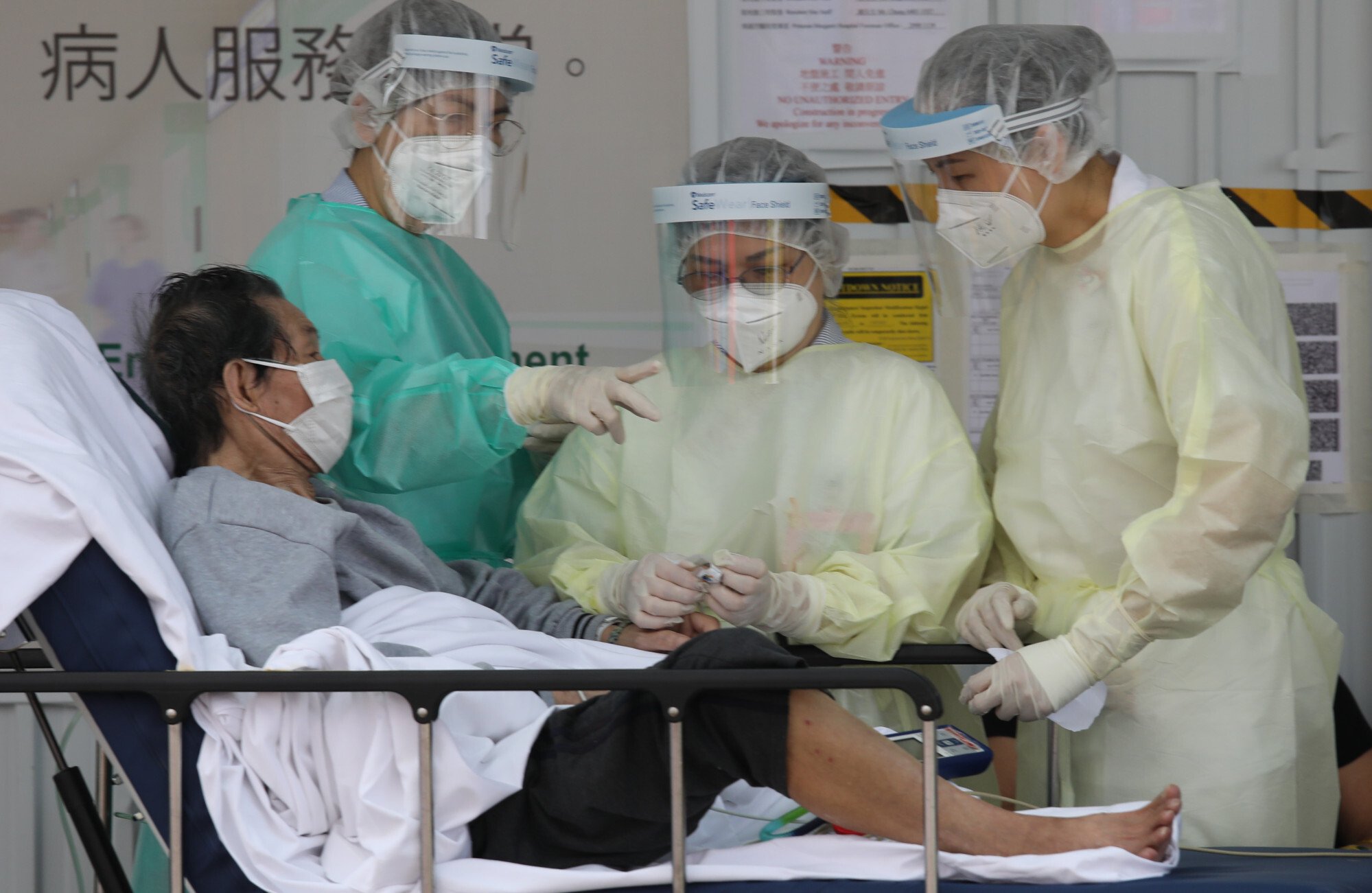
Officials ‘strived for earliest’ reopening
Lam said April 1 was the earliest date the flight ban could be lifted, as there were many logistical considerations involved, and because travellers would need time to book hotels and flights, and arrange Covid testing.
Lam said she had also asked officials to designate more hotels as quarantine facilities for travellers. As of Monday, she noted, around 70 to 80 per cent of rooms in the existing 25 quarantine hotels were booked.
“We have strived our best for the earliest date, and eight to 10 days is already the shortest time [we can manage],” she said.
Resistance from Exco?
Lam declined to comment on a news report suggesting she had to relax the city’s anti-epidemic measures due to discontent among members of her de facto cabinet, the Executive Council.
Mass testing on hold
Carrie Lam said the government’s planned mass testing drive would be suspended.
She said experts had advised that public resources should not be used in such a scheme.
“Hong Kong’s epidemic situation has now been alleviated, but the number of cases remains at a high level. Experts also said at this stage it is not suitable to spend limited resources on universal testing,” she said. “Timing is key.”
Mainland experts who visited Hong Kong had also noticed that the city’s community organisation network and capacity was lower than that across the border, she added.
She said the government would continue to analyse the necessity of the universal testing exercise. “When the time is suitable and conditions are appropriate, we will consider whether to use compulsory universal testing.”
“If we went ahead with the compulsory universal testing today, it would be very troublesome and chaotic,” Lam added.
She said that according to the latest recommendations from the government, people who had been infected with Covid-19 in the past three months would be exempted from any form of mandatory testing.
Social-distancing rules to be relaxed
Social-distancing measures will be relaxed in three phases over a three-month period starting on April 21, provided there is no rebound in cases.
In the first phase, gyms, game centres, beauty salons, massage parlours, religious places, and sport venues will be allowed to reopen, though groups will be capped at four people. Restaurants will be allowed to offer dine-in service until 10pm – up from 6pm currently – with four diners allowed per table, up from two. Bars, however, will have to remain closed.
Groups of up to four people, as opposed to the current two, will also be allowed to gather in public, while a ban on private gatherings of three or more households will also be cancelled.
In the second phase, all other types of business that were forced to close under the fifth wave – including bars and pubs, party rooms, karaoke parlours, and swimming pools – will be allowed to reopen. The cap on groups in restaurants and most other establishments will be raised to eight people, dine-in services will be extended to midnight and mask exemptions will be implemented for outdoor activities. Bars and pubs will be allowed to remain open until midnight or 2am, with a four-people cap at tables.
In the third phase, all caps in restaurants and bars will be lifted and operating hours will be further extended.
Flight bans to be axed, quarantine to be shortened
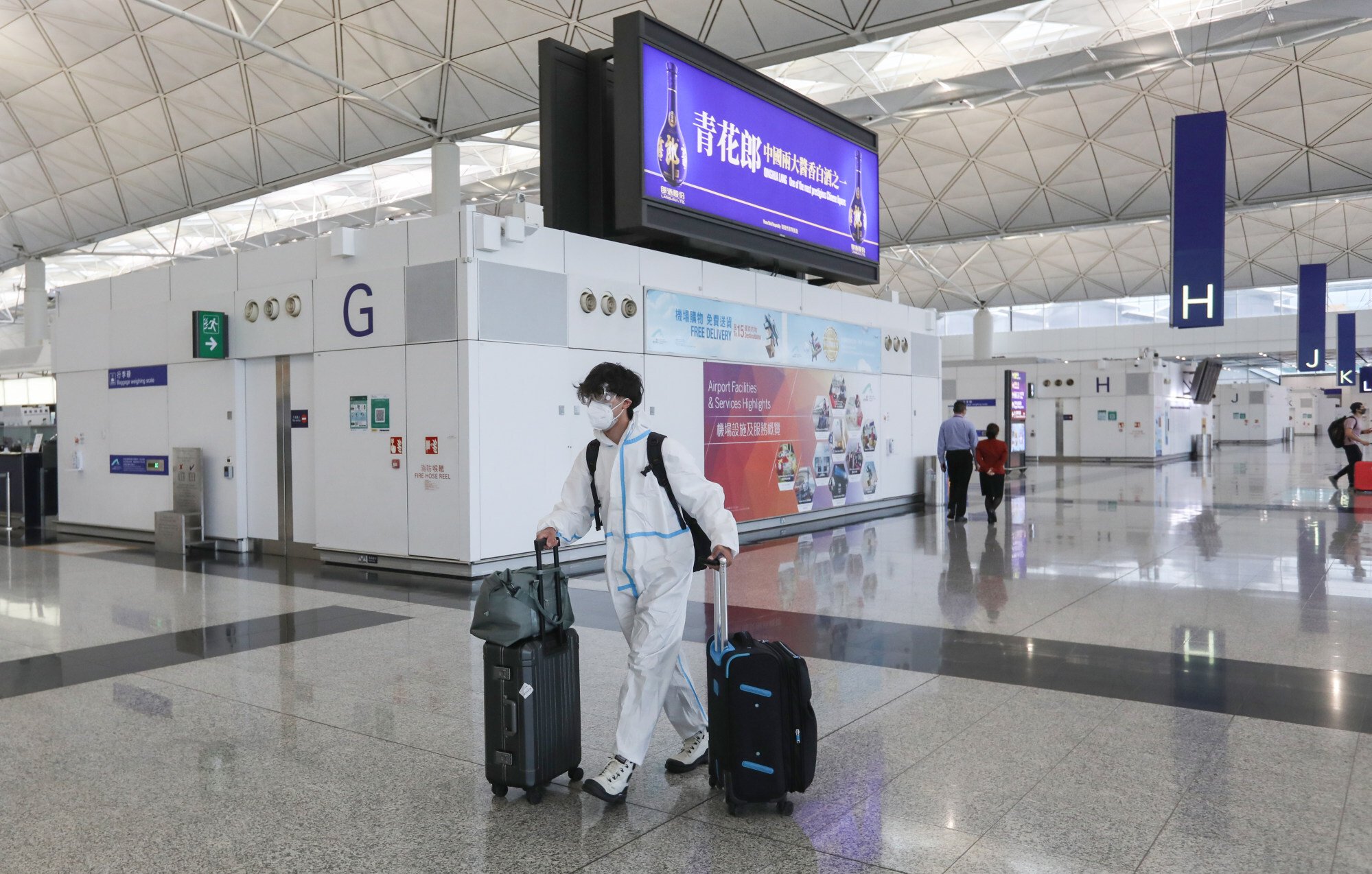
A ban on flights from nine countries – Australia, Canada, France, India, Nepal, Pakistan, the Philippines, Britain and the United States – will be scrapped from April 1.
Returning Hong Kong residents will have to fulfil a few conditions, including being fully vaccinated, testing negative for the coronavirus no more than 48 hours before boarding and having a valid booking at a quarantine hotel.
The quarantine period for overseas arrivals who are Hong Kong residents will also be shortened from 14 days to just seven if they return a negative PCR test result on the fifth day, and negative rapid test results on days six and seven. Travellers who are non-residents are not allowed to enter Hong Kong except those arriving from mainland China, Macau and Taiwan.
Arrivals can also choose to remain in quarantine longer than seven days, with a PCR test to be carried out on the 12th day of their stay.
The flight ban was first imposed on eight of the countries from January 8 due to the global spread of the Omicron variant, with Nepal added to the list on February 12. Under the ban, anyone who has been to those countries in the past 14 days is also forbidden from boarding a flight to the city.
Lam said that given Hong Kong’s socioeconomic needs, the flight ban was no longer up-to-date. She noted that others had also suggested the city’s business environment could be undermined if quarantine requirements for inbound travellers were stricter than those for local residents
Currently, the government allows vaccinated local Covid patients to leave isolation after as little as a week if they test negative on the sixth and seventh day after their infection is first identified.
Anti-pandemic kits for all
Lam said that with the central government’s help, each household in the city would soon be receiving an anti-pandemic kit, though she did not elaborate on their contents.
Improvements would also be made to the system for providing support for households with infections, with Lam saying residents would be able to get necessary supplies the same day they reported cases, instead of days later. Support hotlines and designated clinic services would also be improved.
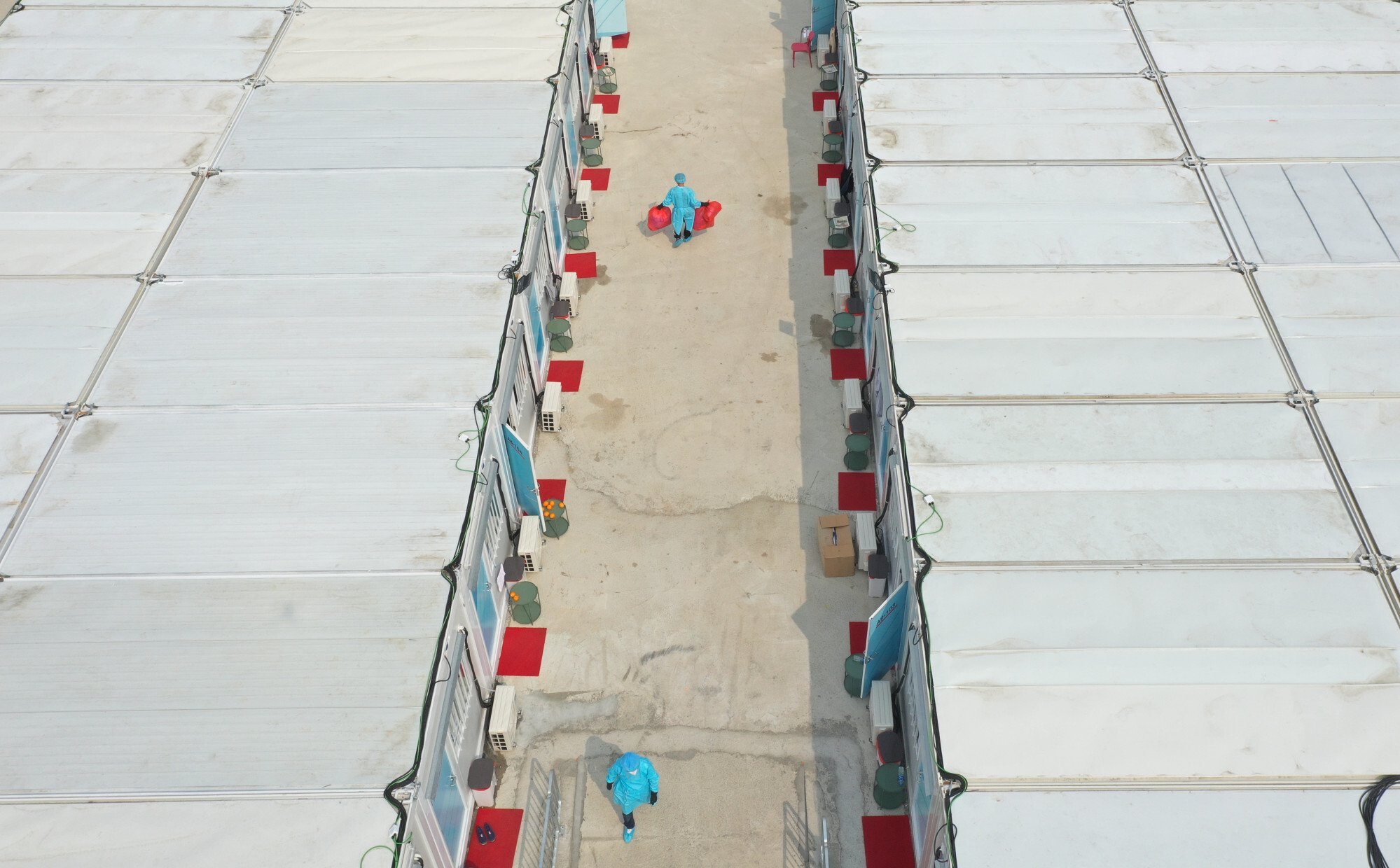
‘The peak is over’
Lam said that there were a few reasons behind the government’s review of its existing anti-pandemic measures, with one being an apparent abatement in the current fifth wave of infections.
Noting the explosive growth of the epidemic had slowed, Lam said: “Many experts regard the peak as likely to be over. Hong Kong’s epidemic development has gone on a downward trend.”
The reproductive rate of the virus recently dropped to around 0.5, meaning each patient was passing the pathogen to fewer than one other person on average, she said.
Meanwhile, tests of the city’s sewage for traces of the virus showed the viral load being shed per person had dropped significantly in the past month, Lam said.
While there had been a rebound in the past two days, she added that she hoped it was just an isolated fluctuation.






